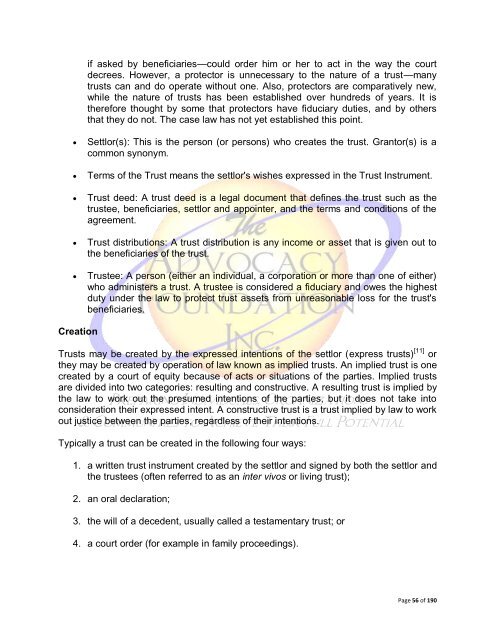Wills, Trusts & Estates
Wills, Trusts & Estates
Wills, Trusts & Estates
Create successful ePaper yourself
Turn your PDF publications into a flip-book with our unique Google optimized e-Paper software.
if asked by beneficiaries—could order him or her to act in the way the court<br />
decrees. However, a protector is unnecessary to the nature of a trust—many<br />
trusts can and do operate without one. Also, protectors are comparatively new,<br />
while the nature of trusts has been established over hundreds of years. It is<br />
therefore thought by some that protectors have fiduciary duties, and by others<br />
that they do not. The case law has not yet established this point.<br />
<br />
<br />
<br />
<br />
<br />
Settlor(s): This is the person (or persons) who creates the trust. Grantor(s) is a<br />
common synonym.<br />
Terms of the Trust means the settlor's wishes expressed in the Trust Instrument.<br />
Trust deed: A trust deed is a legal document that defines the trust such as the<br />
trustee, beneficiaries, settlor and appointer, and the terms and conditions of the<br />
agreement.<br />
Trust distributions: A trust distribution is any income or asset that is given out to<br />
the beneficiaries of the trust.<br />
Trustee: A person (either an individual, a corporation or more than one of either)<br />
who administers a trust. A trustee is considered a fiduciary and owes the highest<br />
duty under the law to protect trust assets from unreasonable loss for the trust's<br />
beneficiaries.<br />
Creation<br />
<strong>Trusts</strong> may be created by the expressed intentions of the settlor (express trusts) [11] or<br />
they may be created by operation of law known as implied trusts. An implied trust is one<br />
created by a court of equity because of acts or situations of the parties. Implied trusts<br />
are divided into two categories: resulting and constructive. A resulting trust is implied by<br />
the law to work out the presumed intentions of the parties, but it does not take into<br />
consideration their expressed intent. A constructive trust is a trust implied by law to work<br />
out justice between the parties, regardless of their intentions.<br />
Typically a trust can be created in the following four ways:<br />
1. a written trust instrument created by the settlor and signed by both the settlor and<br />
the trustees (often referred to as an inter vivos or living trust);<br />
2. an oral declaration;<br />
3. the will of a decedent, usually called a testamentary trust; or<br />
4. a court order (for ex<strong>amp</strong>le in family proceedings).<br />
Page 56 of 190

















